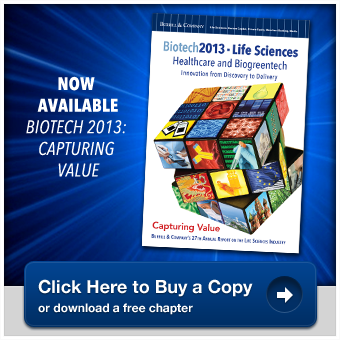“The biosimilar pathway offers tremendous opportunities, says Geoff Eich, Amgen's head of regulatory affairs.”
The Biotechnology Industry Organization and other industry groups are appealing to the U.S. Food and Drug Administration to mandate unique names for biosimilar versions of brand-name biologics as federal regulators take up the issue.
In formal comments filed to the FDA, BIO is taking issue with arguments made by the Generic Pharmaceutical Association’s Citizen Petition asking FDA to use the same international non-proprietary name for both brand-name biologics and their biosimilar competitors. The economic and public safety consequences of using the same name for both, as is the case with generic versions of small molecule drugs, are hotly debated.
“Contrary to the GPhA Petition, we believe that a system that assigns the same name to products that are similar, but not the same, would create confusion for physicians and patients, hinder effective pharmacovigilance, and could jeopardize patient safety,” writes BIO general counsel Tom DiLenge and executive vice president for health Sara Radcliffe. “We believe it is possible to craft a nonproprietary naming convention that both contributes to patient safety through enhanced product identification and improves access to medicines at competitive prices,” they write.
Distinguishable names for biosimilars, BIO argues, would improve product identification, ensure accurate attribution of adverse events to the right product, and prevent inappropriate substitution and unintended switching.
Although there is no international consensus on nonproprietary naming of biosimilars, there is both ample international and scientific precedent for using a distinct naming scheme, BIO says. Japan and Australia have each developed regulations for the approval of biosimilars and nonproprietary naming conventions. And while the European Medicines Agency allows biosimilar products to use the same nonproprietary name as reference products, in 2012 the European Commission directed EU member states to ensure that biological medicines are clearly identified by name of the product and batch number.
BIO filed its response just as the Federal Trade Commission gathered representatives of AbbVie, Amgen, Pfizer and other drugmakers to Washington D.C. to discuss the issue with other industry players such as Aetna, AARP, and Hospira.
The FTC workshop covered the central debates around biosimilars in the United States, including the potential impact of state biosimilar regulations affecting competition, how regulations might be structured to facilitate competition while still protecting patient health and safety, and how naming may affect competition.
“I think all of us would agree that our number one objective is to make sure that every patient who needs a biologic medicine has access to a high quality biologic medicine, full stop,” said Amgen's Executive Director of Regulatory Affairs, Geoff Eich, in summing up the debate during the FTC session. “The biosimilar pathway offers tremendous opportunities.”
February 07, 2014
http://www.burrillreport.com/article-bio_argues_for_unique_biosimilar_naming.html





.gif)